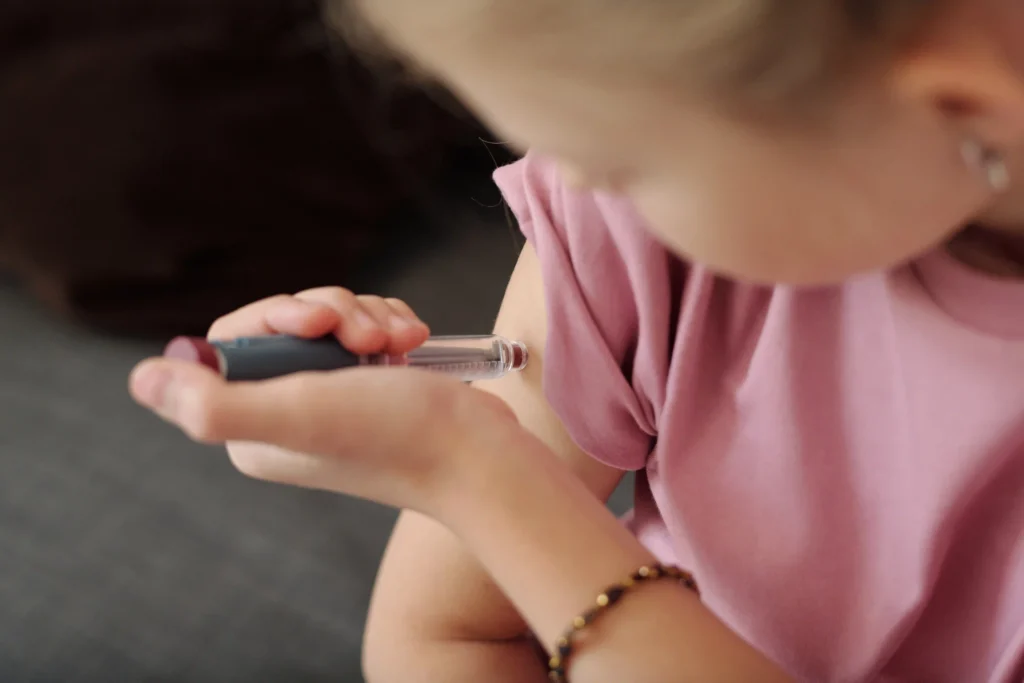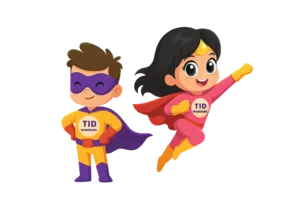Type 1 Diabetes and Children
Type 1 diabetes is most commonly diagnosed in childhood. Recognizing the early signs, understanding daily management, and supporting children in cooperation with parents and healthcare teams are key to ensuring healthy growth and development.
This content is not medical advice. Always consult your endocrinologist, doctor or diabetes care team before making any changes to your diabetes treatment or daily management.
Diagnosis in Childhood
In children, type 1 diabetes symptoms often appear suddenly and can quickly lead to serious complications if not recognized in time. The most common signs include:
-
excessive thirst and frequent urination,
-
unexplained weight loss,
-
fatigue and drowsiness,
-
mood changes and decreased concentration.
Each year, more than 100,000 children under the age of 15 are diagnosed with type 1 diabetes worldwide (IDF Diabetes Atlas). Quick action is crucial, as delayed diagnosis can result in diabetic ketoacidosis (DKA), a serious and potentially life-threatening condition.


Role of Parents and Family
For children, the greatest responsibility lies with the parents. They are in charge of:
administering or supervising insulin,
planning and monitoring meals,
regularly checking blood glucose,
responding to hypoglycemia or hyperglycemia.
Support and patience help the child feel safe and loved. As the child grows, parents gradually involve them in self-care, starting with simple tasks (like checking blood sugar) and moving toward more complex decisions (such as insulin dosing). Family education is just as important as the therapy itself.
Type 1 diabetes in childhood requires the daily involvement of parents, teachers, and healthcare professionals. With timely diagnosis, proper support, and independence, children can grow up healthy and active. What matters most is that they feel safe, included, and never alone in their journey.
Everyday Life, Kindergarten, and School
Kindergarten
Young children depend entirely on adults. Caregivers and staff must know the basics of diabetes, how to recognize low blood sugar, and how to react in emergency situations. In some cases, personal assistants or medical staff are engaged to help with daily care.
School
School staff should be familiar with the child’s condition, including:
how to recognize hypoglycemia,
when to provide a snack or break,
how to act in emergencies.
The presence of medical staff at school, or cooperation with a team (pedagogue, psychologist, nurse), makes life easier for both the child and the parents.
Activities and Peers
Children with diabetes can participate in sports and play just like others, but meals and insulin require planning. They should always have a quick source of glucose at hand. With simple explanations, peers can become supportive and part of the child’s safety network.


Transition to Adolescence
Entering puberty brings new challenges for children with type 1 diabetes. Hormonal changes can make blood sugar regulation more difficult, while at the same time teenagers naturally seek greater freedom and independence.
This is often a period when children rebel against rules and feel exhausted from daily diabetes management (diabetes burnout). Parents and the healthcare team then have a dual role to provide support and understanding, but also to set clear boundaries to keep health under control.
Gradual involvement of teenagers in decision-making, along with open conversations about consequences and responsibility, helps them develop a more mature approach to the condition and their own health.
Psychological Support and Development
Type 1 diabetes also affects a child’s emotions. Frustration, fear, or the feeling of being “different” from peers are common challenges. Parents can help by:
openly talking with the child about their feelings,
emphasizing that the disease does not define who they are,
encouraging every step toward independence.
Support from professionals (child psychologist, counselor) can be very valuable, as can spending time with other children who have diabetes. This way, the child learns they are not alone and develops a positive relationship with their health.
Join as a T1D Warrior

Our T1D Warriors are children, parents of children with diabetes, and individuals living with type 1 diabetes who share their personal experiences to inspire and support others. Every story, every blog post, and every piece of advice you find here comes from someone who has truly lived it — with honesty, courage and a whole lot of heart. Together, we’re building a community where real-life experience truly makes a difference.
Want to inspire others with your T1D journey? Become a T1D Warrior and share your story.
